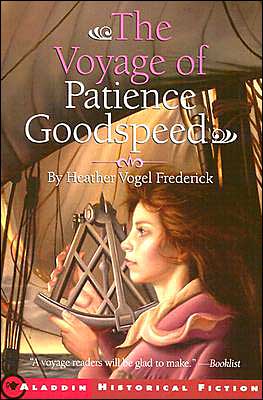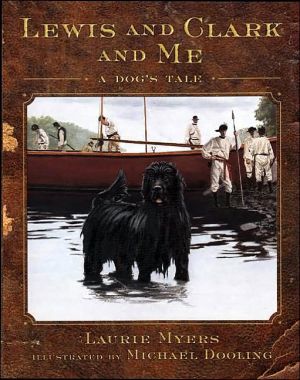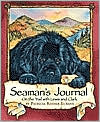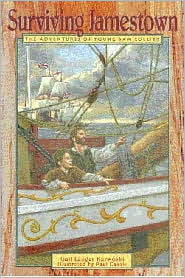Voyage of Patience Goodspeed
October 1835. Patience Goodspeed, almost thirteen years old, departs from Nantucket aboard her father's whaling ship. Between kitchen duty and whale blubber stench, this voyage is far from a pleasure cruise. At least Papa lets Patience assist the ship's navigator since she's so good at calculations.\ But the smooth sailing doesn't last long. Mutinous mates maroon most of the crew, including Patience's father and brother, on a deserted island. Can Patience rescue everyone before it's too...
Search in google:
October 1835. Patience Goodspeed, almost thirteen years old, departs from Nantucket aboard her father's whaling ship. Between kitchen duty and whale blubber stench, this voyage is far from a pleasure cruise. At least Papa lets Patience assist the ship's navigator since she's so good at calculations.But the smooth sailing doesn't last long. Mutinous mates maroon most of the crew, including Patience's father and brother, on a deserted island. Can Patience rescue everyone before it's too late?Publishers Weekly"With the clever, nearly 13-year-old narrator, Patience, at the helm, this fast-paced debut novel successfully steers through a whaling expedition and mutinous uprising," said PW. Ages 8-12. (Apr.) Copyright 2004 Reed Business Information.
Chapter Four\ It's now we're out to sea my boys,\ The wind comes on to blow;\ One half the watch is sick on deck,\ The other half sick below.\ — Blow Ye Winds\ \ October 15, 1835\ Three days outward bound and I have yet to set foot on deck since we weighed anchor. Much to our shame, Thaddeus and I have been confined to our bunks with Neptune's revenge, our stomachs lurching with each roll of the ship.\ Papa laughs and calls us lubbers, and says it will soon pass. Half the crew are equally afflicted, he says. We are all in the same boat, he says, slapping his leg and laughing again at the joke he has made.\ A feeble one, as I find nothing laughable about our condition. I have barely the strength to hold my pen, but am determined to keep my promise and put down on record all my experiences — even this vile seasickness.\ The ship pitches sideways and I grab for the bucket again, glaring at Papa, certain that I will expire here in this cabin. Won't he be sorry then!\ — P.\ \ Papa was right, as it happened. This morning Thaddeus and I awoke good as new, the only pains in our bellies those of hunger. Sprigg, our steward, served us an enormous breakfast and we ate every bite.\ Much to our dismay, in the wake of the accident we had been placed in Sprigg's care for the duration of the voyage. The steward was no more pleased with this arrangement than we were, and spent most of the breakfast hour scowling and muttering darkly to himself. Wizened as a dried apple, with a gray pigtail, spectacles, and a voice like a rusty hinge, a more disagreeable old sea dog than Pardon Sprigg would be difficultto find, though Papa said his temperament was due to his disappointment in life. Sprigg was once a harpooneer, he told us, but his eyes began to fail him a few years ago and now he wouldn't recognize a whale if one swam up and bit him in the behind. Sprigg didn't take kindly to being made one of the "idlers" — what the crew called the cook, cooper or barrelmaker, carpenter, and steward, who stand no night watches on deck, nor lower away into the whaleboats when our quarry is sighted — but it was either that or leave the sea altogether. And if Papa was the undisputed monarch of our shipboard kingdom, Sprigg was if nothing else a loyal subject, no more disposed to being landlocked than he was to having us added to his duties, which certainly did not improve his humor.\ Terrified that we would get into some mischief and bring the wrath of Papa down upon his head, Sprigg made us sit at the table for a full hour while he cleared away the breakfast dishes and tidied both the main cabin and the pantry. Fairly prostrate with boredom, Thaddeus and I made goggle eyes at each other behind his back, until Papa finally came below and gave us — and the peevish steward — a reprieve.\ "I'll take the children now, Sprigg, you may go about your other duties," he said.\ "Aye, sir," said a visibly grateful Sprigg, who disappeared into the pantry with more speed than I'd have given his aged legs credit for.\ Thaddeus and I tottered up on deck after Papa, still a little wobbly from our bout of seasickness.\ "Mind you keep a weather eye on your brother, now, Patience," said Papa, "and stay aft here where you won't get in the way."\ I glared at him. "Why did you drag us along, then, if you're so worried that we'll be in the way?" I muttered.\ Papa looked at me sharply, seemed on the point of saying something more, then spun on his heel and stalked forward to where the officers were gathered.\ The sun was painfully bright after my days of confinement below, and I moved into the shade of the afterhouse and stood at the taffrail, breathing deeply the clean, salt-sharp air. The Morning Star's wake spun out behind us like a line of fresh washing flapping in the breeze, a steady curl of white foam against the deep, deep blue of the sea.\ We were completely alone on the water, with nary a speck of land in sight. Blue sky and blue sea stretched away to every point on the compass, with only the faintest of lines to distinguish where they joined at the horizon.\ There was a fine breeze, too, and moving forward again, I braced myself against the skylight and looked upwards to where the sails stretched taut, full-bellied before the wind. The rigging hummed with each strong gust, and in spite of my black mood I felt a rush of exhilaration as we surged through the water and the deck swayed beneath my feet.\ My stomach gave a sudden lurch as I looked around me and realized that Thaddeus was nowhere to be seen. Before concern could blossom into full-blown panic, however, his head popped out from behind the mizzenmast.\ "Patience!" he cried happily. "Come and see what Chips has made for me!"\ I followed him past the deckhouse, hesitating at the line that Papa had had painted across the deck. Forward of this line we were not to go under any circumstances, he had informed us at breakfast, unless we were invited.\ "Captain's given permission, miss," Chips called, seeing my hesitation.\ I followed Thaddeus to the worktable beneath the mainmast that is Chips's kingdom. His name wasn't really Chips, Cousin Jeremiah had told us, it was William Thomas, but it was tradition at sea to call the ship's carpenter "Chips" — for the curls of wood and sawdust shavings that characterized his trade, I supposed.\ Thaddeus stopped in front of a small, boy-size boat that was lying on the deck.\ "I thought it might cheer him up, what with the seasickness and all," the tall dark man said with a shy smile.\ I prodded my brother and nodded significantly in Chips's direction.\ "Thankee, sir, for the fine gift," Thaddeus said dutifully, with a worshipful glance at the carpenter.\ Proper etiquette thus observed, Chips hoisted the little boat onto his shoulder and carried it back to the deckhouse. Now that we were under way, Papa said that he would use his day cabin for an office and had turned the small shed over to Thaddeus and me. It would be a safe place for us to play and do our lessons, he said. Inside, there was a table bolted to the wall, a bench, and a low, short bunk that would serve as a sofa, whose cushions lifted to reveal a storage locker beneath for toys, books, blankets, and the like.\ "All hands on deck!" shouted Cousin Jeremiah, and I peeked forward curiously as the men gathered obediently by the mainmast.\ I glanced at Thaddeus, who was playing with his new boat, happy as a clam at high tide, and wondered if it were safe to venture further forward. Papa was bound to notice if I stepped over the painted line, however, and it wouldn't do to vex him again so soon, much as I dearly longed to get a closer look at the buzz of activity.\ There must be a better vantage point, I thought. I looked up. Papa had banned us from the ratlines, the ladderlike ropes that led up into the rigging, but he hadn't said anything about not climbing elsewhere. I contemplated the spare whaleboat that rested atop the midship shelter, a broad platform of planks extending forward from the deck house, from which sprouted pegs for buckets and racks that bristled with harpoons and lances and other sharp implements of the whaling trade.\ Grabbing a bucket, I turned it over and set it on the deck. I glanced around, but no one was paying me the slightest bit of attention. Stepping onto it, I managed to clamber onto the roof of the deckhouse, and from there picked my way over a pile of oars and pulled myself up onto the overturned whaleboat.\ Papa was standing on the main hatch, his back turned toward me. So was Sprigg's, fortunately.\ "Patience, can I come up too?" My little brother had discovered my hiding place.\ "Oh very well," I replied crossly, and reached down to haul him up. "And it's may I, not can I."\ We surveyed the crew, and I gasped in alarm as I recognized the two ruffians from the Spouter Tavern. Beefy wharfrats both, they lounged insolently against the waist of the Morning Star, the one called Binyon picking his teeth with a wicked-looking knife.\ "Quick, Thaddeus, get down!" I whispered urgently. "Don't let them see you!"\ My brother ducked his head obediently, and we slid off the overturned whaleboat and flattened ourselves onto the roof. Quietly, I reached over the edge, and grabbing first one bucket, and then another, slowly, carefully pulled them up and placed them in front of us. Not the most artful concealment, but it would have to do. I didn't want to risk climbing back down onto the deck, for fear we might knock something over and attract attention.\ "Do you think they saw me?" asked Thaddeus anxiously.\ I put my arm around his shoulders and gave him a reassuring squeeze. "Not at all, Tad. Anyway, they were none too steady on their feet that day, as I recall, and I doubt they have any memory of our meeting."\ He relaxed a bit at this, and we peered around the edges of the buckets at the rest of the crew. There were well over a dozen of them, a ragtag assortment of age, size, and color. Several looked fairly young — one in particular, a red-headed lad with a broad, honest face whose greenish pallor revealed a lingering discomfort with life at sea, could only have been a few years older than me. At breakfast earlier, Cousin Jeremiah had described the men as "polyglot" — which meant many-tongued, he told Thaddeus and me.\ "Besides Nantucket men, the Morning Star's crew hails from New York and Ohio, from England and Ireland, Germany, Sweden, Italy — why, there are even a pair of brothers from the Sandwich Islands. 'Kanakas' we call them."\ I spotted the Kanakas right away, standing side by side, their bare arms covered with rather alarming-looking tattoos. They were nearly as dark skinned as Chips, who was one of the many free blacks who resided on our island, which with its Quaker influence harbored a strong antislavery sentiment. Next to Chips stood Owen Gardiner, our cooper, and beside him were Sprigg and the cook. The officers were massed behind Papa, who began to speak.\ "Well, men," Papa said sternly, looking very fine in his blue coat and stovepipe hat, "you've come a-whaling, and a-whaling you shall go. We are setting out on this voyage for one reason and one reason only. To get a cargo of oil. If you pull your weight and obey orders, we'll succeed, and all return home the richer for it."\ He thrust his hands behind his back and leaned forward. I couldn't see his face from here, but by the tone of his voice I knew that his eyebrows were lowered into their storm warning position.\ "I won't stand slackers or grumblers, and I won't stand for disobedience or disrespect to me or the officers," he said, with a sharp glance at Binyon, who straightened up and affixed a meek expression to his face. "There'll be no fighting, no skylarking, and no sleeping on watches."\ Papa continued on in this fashion for a bit, laying down the law, then turned to the business of whale hunting.\ "You will each take a turn at the masthead lookout, and you must sing out lively when you spot a whale," he said. "If you see a spout, sing out, 'There she blows!' If land, shout 'Land ho!' and if another ship, 'Sail ho!'"\ Papa held up a shiny silver dollar. It glittered in the bright morning sunlight, drawing every eye like a magnet.\ "This goes to the lucky man who spies our first whale," he said, as Cousin Jeremiah passed him a hammer and nail. Papa stepped down from the hatch and, turning, strode ceremoniously to the mainmast. Thaddeus and I ducked our heads again and held our breath, hoping he wouldn't spot us. With a few loud whacks, he nailed the silver dollar to the wood. "Keep a weather eye out now, men, and good luck to you. Mr. Folger, let the officers choose the watches and boat crews."\ With that, Papa strode aft, passing directly beneath us and disappearing down the companionway.\ We returned our attention forward to where the mates were dividing the men into two groups. Cousin Jeremiah had explained this process to us at breakfast, using pieces of toast to serve as the Morning Star's four whaleboats.\ "Your Papa's boat hangs off the starboard davits — that pair of curved wooden posts that extend out over the side of our ship," he said. "Directly opposite, on the larboard or port side, is my boat. In front of it is the waistboat, which belongs to Mr. Chase" — the second mate hoisted his coffee cup in a mock salute — "and Mr. Macy's boat hangs off the port bow. The men will be divided into watches, as well as into crews to man the whaleboats."\ From where we were seated now, it all became clear. After the men had been divided into two groups, Cousin Jeremiah moved one group to the starboard side of the ship.\ "You men constitute the starboard watch," he announced. "Mr. Chase is your watch officer. You others" — he turned to face the group on his left — "are the port watch, under Mr. Macy."\ "What's a watch, Patience?" Thaddeus whispered, mystified. "Is he talking about Papa's pocket watch?"\ I had to smile at this. "No, Tad. A watch at sea means something entirely different. It's the period of time during which the men are on duty. The port and starboard watches will take turns all day and night, one watch working while the other rests."\ My little brother nodded his head, his brow puckered as he absorbed this information.\ "Mr. Chase, Mr. Macy, you may split the men into boat crews," Cousin Jeremiah said.\ I glanced over at the spare whaleboat beside us. It seemed a frail craft, little more than a canoe, really. To think of taking it out on the open sea after a whale!\ Cousin Jeremiah started aft toward us. He paused briefly beneath the midship shelter and cleared his throat.\ "You'd best come down from there before Sprigg sees you," he said softly. "And put those buckets back where you found them."\ Reluctantly, we climbed down. Cousin Jeremiah winked conspiratorially, and said he'd try and gain permission for us to watch the morning's training from behind the steerage hatch.\ "That's all right, Cousin Jeremiah," I said hastily. "We can watch from the deckhouse."\ I didn't add that we'd be safer there from prying eyes, too. Despite my assurances to Thaddeus, I didn't want to risk jogging the memory of Binyon and his companion.\ The deckhouse wasn't a perfect vantage point, but still, we were able to see enough as Papa and the other officers spent the next few hours breaking in the new hands.\ Learning to reef and steer, to trim the sails smartly when told to and to coil each line neatly and put it in its proper place was clearly no easy task for the "greenies," as Papa and Cousin Jeremiah called those with no experience at sea, and soon Papa was hollering at the top of his voice, peppering his orders with "thunder and lightning" and "blast" and the rest of his favorite cuss words, and even adding a few I had never heard before.\ "I can tie knots better than that red-haired fellow over there," said Thaddeus, nudging me.\ "I believe you're right," I replied, watching as the boy fumbled with the end of a rope, and finally threw it down in frustration.\ Papa shook his head in disgust, and the fellow's more able shipmates — led by Binyon, I noted — began to make sport of him, calling him "hayseed" and "bumpkin" until he was close to tears.\ A few minutes later, when he caught his foot in a line and he was accidentally hauled upward along with the mainsail, the whole crew exploded with laughter. He dangled upside down some ten feet above deck for a minute, until the cook rang the bell for dinner and Cousin Jeremiah came to his rescue.\ After he was safely disentangled, the red-haired boy headed toward the fo'c'sle, a dejected look on his face.\ "Young Firetop there is as green as my Aunt Lily's lettuce patch," said Binyon, and another shout of laughter went up as his hapless prey's face turned bright pink. He nudged his companion. "Ent that right, Todd?"\ The other sailor nodded. "Green as a pond frog," he echoed.\ "Leave him be now, boys," said the tall, fair-haired sailor who had serenaded our departure, a Swede I'd heard the men call Long Tom.\ Binyon swiveled around. "Who are you to tell us when to leave off?" he said belligerently.\ "You've had your fun," said Long Tom evenly. "Why don't you go cool off before dinner."\ "We'll cool off when we're ready to cool off," Binyon replied, taking a step toward him.\ Chips, who had been busy at his work table, straightened up and nodded at Owen Gardiner, the cooper. Moving quietly, they closed in behind Long Tom, and the three of them stood facing Binyon and Todd.\ "Is there going to be a fight, Patience?" asked Thaddeus in a nervous voice.\ "Hush, Tad," I said, wishing fervently that we were belowdecks.\ Cousin Jeremiah suddenly materialized. "Is there a problem, gentlemen?" he asked calmly. "You heard the captain, there's to be no brawling on this ship, and I assure you that anyone I catch at it will be dealt with most severely."\ With a defiant jerk of his chin at Long Tom, Binyon swaggered off, trailing Todd behind him.\ "Well, don't just stand there like ninnies, didn't you hear the dinner bell?" said Sprigg in an exasperated voice, coming up behind us as the rest of the men dispersed. Grabbing us both by our ears, he marched us below.\ The noon meal was a lively affair. Cousin Jeremiah said nothing of the disagreement on deck, and, with appetites sharpened by the fine weather, we all tucked into our plates of stew with gusto. Papa and the officers took great delight in recounting the morning's misadventures in general, and those of the red-haired boy, whose name we were told was Charlie Fishback, in particular.\ "Have you ever seen such a lubber?" Papa asked. "Fresh off the farm — I'd wager the only line he's ever held had a cow at the other end!"\ "Clumsy as a hog on ice," agreed Mr. Chase.\ Cousin Jeremiah winked at Thaddeus and added, "I declare I saw a piece of hay still stuck behind one of his ears!"\ A roar of laughter went up around the table, and though I felt sorry for the poor boy, even I had to giggle at that. Only our cook didn't laugh. His name was Obadiah Glumly, and never had there lived a man so aptly named. His face was set in a perpetually mournful expression, which set me to wondering whether people lived up to the names their parents chose for them. But I quickly discarded the thought, for I was certainly the most impatient creature imaginable.\ In fact, Mama used to tell me that she named me Patience because she could tell the minute I was born it was a virtue of which she was going to be greatly in need.\ Glum, as everyone called him, was nothing like what I thought a cook should be. Cooks should be like Martha, fat and cheerful and fond of the meals they provide. Glum was forlorn and cadaverous, and if he ever swallowed a bite of food, I don't think anyone had caught him at it yet. When he called us to dinner, you would swear he was announcing a funeral, so remarkably solemn was his tone.\ Bald as an egg and with not an ounce of spare flesh on his tall, storklike frame, he lingered on the companionway stairs at mealtimes, arms folded across his narrow chest, and watched dolefully as each forkful of food progressed from the plate to our mouths. It was enough to spoil anyone's appetite, although I seemed to be the only one who noticed. Everyone else ignored him.\ At dinner, I learned that we were still at least a week's sailing from the Azores, or Western Islands off Portugal, where we would put in at Fayal for fresh supplies and fill out our complement of experienced hands. Papa said the Portuguese islanders were well known for their seamanship, and he was eager to round out our crew before we reached Cape Horn.\ October 16, 1835\ Cape Horn! The very words fill me with dread. To anyone raised on Nantucket they are synonymous with danger and death.\ "The graveyard of the sea," sailors call it, and from childhood I have heard hair-raising tales of passages round that icy, forsaken bit of land that juts down from South America like the tip of a harpoon. Weather so cold that even in summer blankets freeze solid. Treacherous winds that howl down from the Andes and raise waves so high they look like mountains, and can swallow a ship twice the size of a whaler. Even though Papa says this is the most favorable time of year to make the passage, I find myself growing more anxious with every day that brings us closer to it, and with the added discovery of Binyon and Todd aboard, I am altogether uneasy.\ — P\ \ Copyright © 2002 by Heather Vogel Frederick
\ From the PublisherBooklist A voyage readers will be glad to make.\ Publishers Weekly The brave heroine makes this historical adventure most memorable.\ \ \ \ \ \ Publishers Weekly"With the clever, nearly 13-year-old narrator, Patience, at the helm, this fast-paced debut novel successfully steers through a whaling expedition and mutinous uprising," said PW. Ages 8-12. (Apr.) Copyright 2004 Reed Business Information.\ \ \ School Library JournalGr 5-7 After the death of their mother, Patience and her younger brother, Tad, are taken by their captain father aboard his whaling ship for a three-year journey. At first, Patience desperately misses her Nantucket home, but she slowly grows accustomed to life at sea. The 12-year-old isn't thrilled to be confined to menial housekeeping chores, but after she is the first person to spot a whale, her father teaches her to use navigation equipment. When the ship is later threatened with sabotage by mutinous sailors, the girl must put her newfound skills and confidence to the test. Patience is a fully fleshed-out character, with layers of strength, intelligence, courage, and resourcefulness. She is also seeking approval from her father and anxious about her role on the ship and in life. Readers get a good sense of conditions aboard a whaler in 1835 and what daily life entailed. Nautical terms are included, but are not too technical and are woven throughout the text smoothly enough to glean the meaning (a glossary is included). The flow and pace of the novel are breezy enough to hold reader interest. Overall, a delightful journey with an appealing, well-rounded character. -Kristen Oravec, Cuyahoga County Public Library, Strongsville, OH Copyright 2002 Cahners Business Information.\ \ \ \ \ Kirkus ReviewsCharlotte Doyle goes a-whaling. Well, not quite, but this feisty heroine owes a lot to her seagoing forebear. When her widowed father, the captain of a Nantucket whaler, determines to take his two children to sea with him, 12-year-old Patience is reluctant to go. After all, she has been studying with Miss Maria Mitchell and shows especial promise in mathematics; a years-long sea voyage would be an unbearable interruption in her studies. But Captain Goodspeed proves to be as irresistible as the tide, and Patience and six-year-old Tad join the crew of the Morning Star, where she comforts herself by learning the art of navigation. The plot is as predictable as a whale is big: the two rough characters Patience encounters on the docks at the beginning naturally show up on board to dog her, forming the core of the inevitable mutiny led by a scurrilous replacement first mate. Patience, having won over the bulk of the crew, puts her navigational skills to the test and manages almost single-handedly to thwart the mutiny and to rescue the Morning Star. Sound familiar? Still, if the plot is a wee bit transparent, the details surrounding it are rich, from the descriptions of sailing and whaling to the colorful cast of characters that make up the crew to the emotional journey both Patience and her father must travel as they grieve her mother and establish a new relationship with each other. Newcomer Frederick appends an author's note, two recipes, a glossary, and an acknowledgments page that bespeaks the considerable research behind the novel. A solid, if not particularly venturesome, adventure. (Fiction. 9-12)\ \







